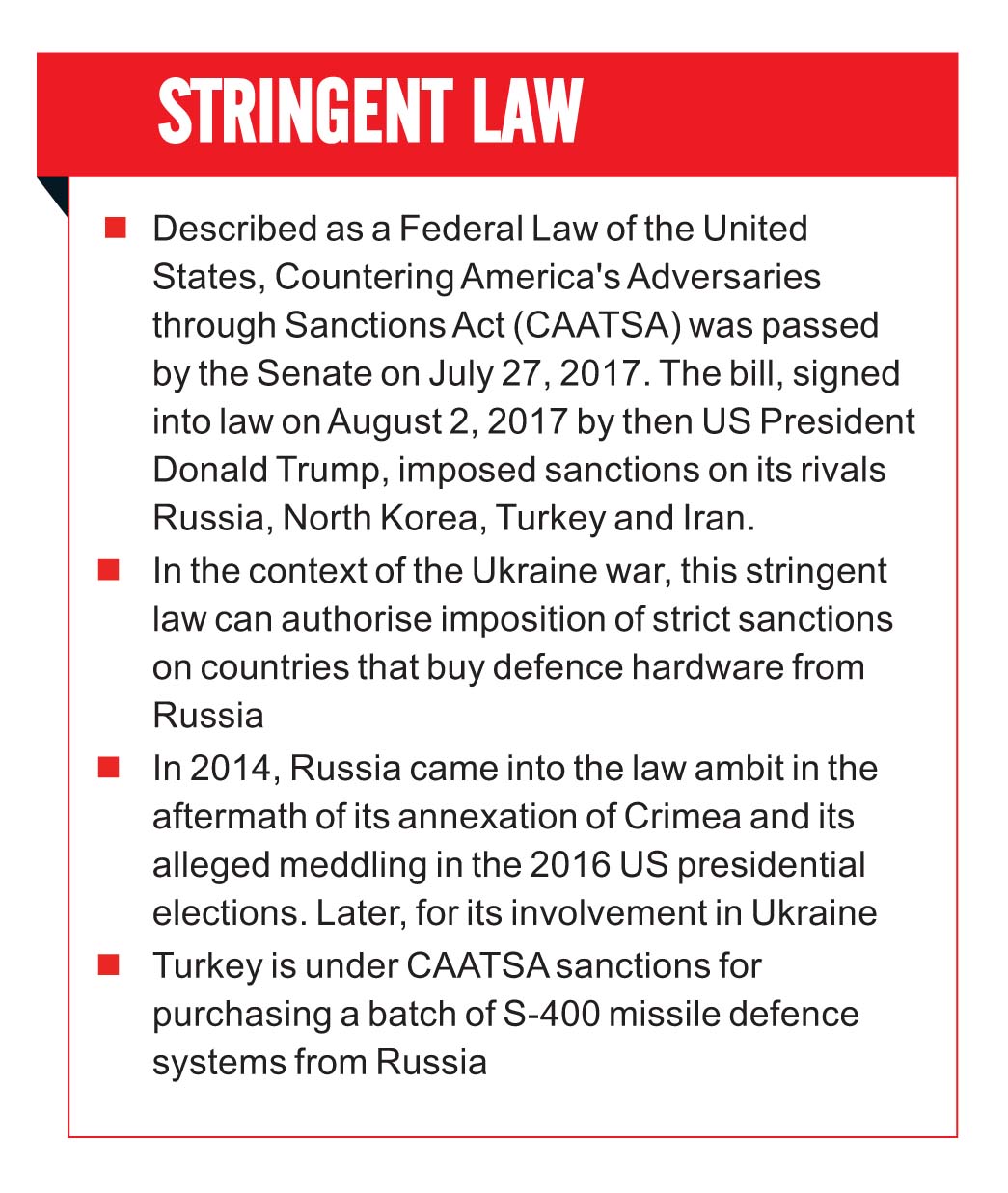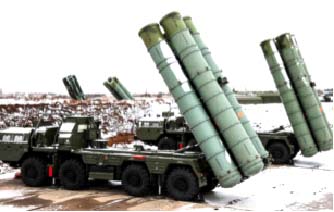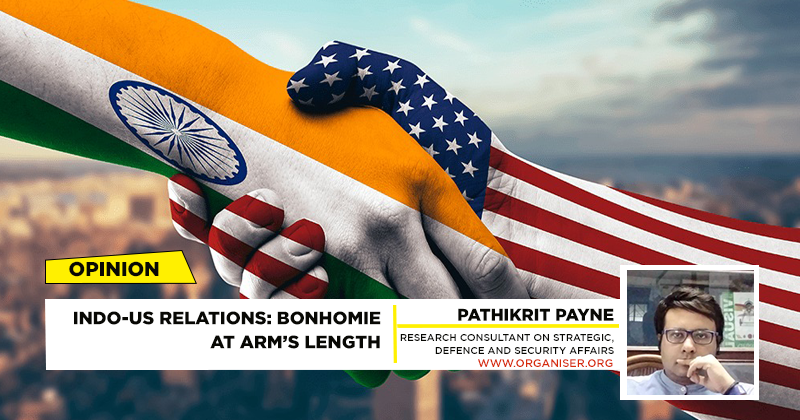The credit for tightrope walking amidst changing global environment where India’s concerns and aspirations are now well respected goes to the Modi Government. Two major path breaking incidents happened in the past few days that have long term positive ramifications for India. Yet sadly, both remained relatively out of public discourse, a grim reality check of how little critical issues with long term implications for India, generally don’t get the kind of traction that they ideally deserve.
The first of these was the CAATSA (Countering America’s Adversaries Through Sanctions Act) Sanctions waiver that India got from the US through a legislative amendment in the House of Representatives, which essentially means that India would be exempted from punitive sanctions that the US Government had started imposing since 2017 on any country which purchases military hardware from Russia.
The second critical incident was the announcement by the RBI that it has set up a mechanism for rupee payment settlements for international trade. Both these incidents are landmark in nature and are vindication of the coming of age of India as an emerging economic and military powerhouse, which is now confident about its firm footings and global ambitions.
India’s Defiance of CAATSA
For quite some time now, CAATSA sanctions have been America’s tool to arm- twist anyone who endeavours to acquire critical weapon systems from Russia.
However, CAATSA was not just restricted to defence deals only and included in its purviews major energy projects with Russia as well. India’s decision to acquire S-400 air defence system from Russia for a whopping $5.4 billion did not go down well with the US, which threatened India with CAATSA sanctions just as it had imposed sanctions on India in the aftermath of 1998 nuclear tests conducted by India under the Vajpayee Government. But much water had flowed down the Ganges and Moskva since then. India is now a $3.5 trillion economy (nominal GDP) with more than $580 billion forex reserves and $670 billion of total exports, and which has emerged stronger and more resilient in the aftermath of the COVID-19 crisis. In terms of Purchasing Power Parity (PPP) it was now the third largest economy in the world with a GDP of $11.74 trillion, and one which is slated to be a $10 trillion economy in terms of nominal GDP by 2032.
Emergence of a New Bharat
The emergence of new India that is hawkish about pursuing its own independent foreign policy including cross border defence and energy deals, was reflected by the statement of former External Affairs Minister of India late Shrimati Sushma Swaraj when in May 2018, before meeting the Iranian Foreign Minister, she stated, “India follows only UN sanctions, and not unilateral sanctions by any country”, a clear snub to the US and an indication that while India remains a trusted strategic partner of the US, it would acquire weapon systems from the US as well, it would not dither from pursuing its own independent foreign policy and would certainly never ditch her long trusted and tested friends such as Russia.
In other words, since the execution of S-400 deal with Russia, in spite of US warnings, India has made it clear that threats of sanctions would not work anymore and that India has enough resilience to withstand such sanctions if imposed by US. Instead, imposing of such sanctions may become counter productive for American companies operating in India given the large and emerging market of India and deep economic ties that both mutually share.
The deal for S-400 was followed by many more critical deals including that of four more Talwar class frigates, leasing of a Russian nuclear-powered submarine and joint production of Russian AK-203 series rifles in India. Good Relations with Both Russia and US

However, it is not to say that India is more of an adversary of the US now. All this while, India also purchased critical weapon systems such as Apache Helicopters, Chinook Helicopters, MH-60 Helicopters, M-777 Howitzers, C-130, C-17, P8I aircrafts and Harpoon Missiles from US as well, over the last one decade or so. Also, both India and the US have over the years come even closer and trust each other with critical technologies especially those with both civil and military applications. The US did play a critical role in making India enter the MTCR (Missile Technology Control Regime) club that gives India access to critical missile technology, Wassenaar Arrangement and Australia Group, both of which allows India access to critical nuclear technology for civilian applications.
India’s Persistence Makes US Relent
Yet, the US has over the last few years realised that India cannot be coerced into a better relationship by forcing it into shunning its legacy friends. This is why the CAATSA sanctions waiver is not just a major victory for India but also a reflection of the US being more accommodative towards the world’s largest democracy, a major economic and military powerhouse, and rightfully so.
This also helps the US in the sense that India today remains one of the very few countries in the world which has good relationship both with Western power blocs as well as Russia, and at a time when communication channels have all but snapped between NATO members and Russia. India thus remains a trustworthy mediator, trusted by both, who can act as a catalyst to reduce tensions, if and when things get totally out of control between the two. It is, however, during the ongoing Ukraine- Russia war that India’s strong insistence to remain neutral instead of taking a stand against Russia, her insistence to buy oil from Russian firms in spite of sanctions by US, her exposing of Western double standards on being accommodative of European purchase of gas from Russia, while being critical of India when it buys oil from the same that has significantly altered the landscape of global geopolitics and shown once again how the footprints of global economic theatre and geopolitical leverages no longer remain the exclusivity of the Western power blocs.
Former External Affairs Minister of India late Sushma Swaraj in May 2018, had indicated that while India remains a trusted strategic partner of the US, it would acquire weapon systems from the US as well, it would not dither from pursuing its own independent foreign policy and would certainly never ditch her long trusted and tested friends such as Russia
No other country has questioned the apparent western double standards on critical issues as India has done when the Russia-Ukraine conflict started. Instead of following the western dictums to blindly take a side, as most did, India’s External Affairs Minister, stated in no uncertain terms, “In the case of Ukraine, a lot of it derives from the post-Soviet politics, the expansion of NATO, the dynamics between Russia and Europe, and Russia and West broadly”. In other words, India blatantly questioned the rational behind the mindless expansion of NATO and taking it to the doorstep of Russia, even when the Cold War ended for good more than thirty years back and Russia apparently posed no threat to any European country and instead had wanted to ally with NATO once. On oil purchase too, India’s External Affair Minister questioned the double standard of West. On the issue of Western narrative that tried to project India as a sort of ‘financier’ of Russia’s war against Ukraine since India was purchasing oil from Russia at a discounted price, India retorted assertively. External Affairs Minister S Jaishankar, questioned back, “Is buying Russian gas not funding the war?” He asked, “Its only Indian money and oil coming to India that funds it, but not the gas coming to Europe? Let’s be a little even handed out here.”
For an oil importing country like India, it becomes extremely challenging when unilateral sanctions are imposed on major oil producing countries that results in massive rise in price of oil. Sanctions on Russia came at a time when oil prices were already high due to sanctions imposed by West (rather US) on Iran and Venezuela, two major oil producing nations. India thus had little option but to scout for discounted oil to reduce burden on its economy. Russia was thus the natural choice.
Yet India watched silently how Russia banks were banned by SWIFT (Society for Worldwide International Financial Telecommunications), an international system used by banks for exchange of messages during transactions. A combination of sanctions imposed by US, Europe and G7 along with banning of Russian banks from SWIFT meant that any kind of transactions with Russia for purchase of oil, gas, commodities like coal or defence procurements would henceforth be extremely challenging since banks would be extremely apprehensive of defying the ban on Russian banks by SWIFT for fear of being blacklisted, even as transactions through dollar with Russia would no more be possible. Add to it, after freezing of foreign currency reserves of Afghan Government in the aftermath of Taliban returning to power post US exit, similar restrictions on foreign currency reserves of Russia were imposed as well.
Both these incidents rang alarm bells in India perhaps. It was not just because it would make transactions with Russia challenging but there was also this nagging thought as to what would happen if the West imposes similar SWIFT ban on India, for some or the other pretext, in future? How would India operate then? What happens if India’s Western currencies denominated forex reserves are similarly frozen in future, on the pretext of any dispute of differences with the West? What is the point then of putting so much effort in maintaining a cost forex reserve in some of the most stable currencies if they get frozen during challenging times in future?
Rupee Settlement Scheme
RBI’s introduction of rupee settlement mechanism for international trade is a sort of defiance of Western threats and Western dominance and perhaps is one of the many such reforms that Modi Government may initiate in the times to come for the sake of making sure that India’s global trade and independent foreign policy is not held hostage by Western stranglehold on key multilateral institutions as well as reliance on western currencies for holding foreign currency reserves does not end up as an Achilles heel.
As an immediate effect, India’s decision to go ahead with a Rupee settlement scheme for international payments may result in savings of hard currencies of around $30-36 billion. India’s immediate trade imperatives in Rupee currency would be mostly with Russia and Sri Lanka. At a later stage it may get expanded to other countries as well.

The US has over the last few years realised that India cannot be coerced into a better relationship by forcing it into shunning its legacy friends
However, internationalisation of Rupee as a currency may have just begun but would still take a lot of work to make it a reserve currency as it would require full convertibility options. Nevertheless, for India’s own trade requirement this is a great step in the right direction and countries like Sri Lanka, going through severe financial crisis, may also take steps to put some of its forex reserves in Rupee as it would far more convenient than keeping the same in other currencies. Interestingly, both Russia and China have already created their own versions of SWIFT, namely SPFS (System for Transfer for Financial Messages) of Russia and CIPS (Cross Border Interbank Payment System) of China. Though both are in limited use, the possibility of India coming out with its own interbank messaging system for international transactions, as a safeguard, along with spreading out its foreign currency reserves in more of gold and diversified currencies, thereby reducing exposure to Dollar and Euro, cannot be ruled out, given the increasing propensity of the West to impose sanctions on these.
While it is for sure that India has no intention to get into perpetual face-offs with the West, the Rupee payment settlement mechanism is an indication that when it comes to securing its own interests, India would not shy away from developing indigenous mechanisms just as it did the same in the realm of ballistic missiles, cryogenic engines, super computers and many more, each of which has been a result of technology denial strategy of the West.
Road Ahead is Full of Challenges
As India emerges out of decade-long shackles, the road ahead may be exciting but not without challenges.
On one side, there is China whose activities along LAC is far from sublime, while on the other hand there is Pakistan, a near failed State and an established cradle for nurturing radical extremism. India faces major challenges from both who often are seen to be collaborating against India.
As India meanders through a difficult terrain to become more resilient economically along with developing capacity to deal with all kinds of external military challenges simultaneously, it would need to walk a fine balance between containing its intransigent neighbours, while unshackling from the West imposed restrictions, even while maintaining cordial relation with the West for expanding its economy as well as for deepening shared areas of interests. It is for these reasons India has been extremely nuanced in its approach, tonality and response, where even while charting her own path of independent foreign policy, it has not at any point of time made the West feel that it is walking away from rules-based orders and ethos of democracy, human rights, value systems and people to people connect that bind India with the Western world.




















Comments